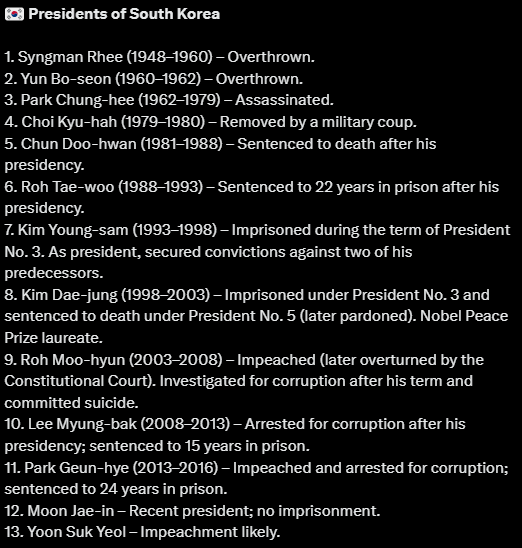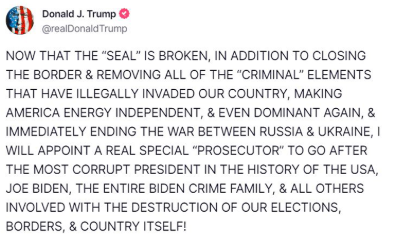
World's Largest English Language News Service with Over 500
Articles Updated Daily
"The News You Need Today…For The World You’ll Live In Tomorrow."
What You Aren’t
Being Told About The World You Live In
How The “Conspiracy Theory” Label Was Conceived To Derail The
Truth Movement
How Covert American Agents Infiltrate the Internet to Manipulate, Deceive and Destroy Reputations
December 5, 2024
By: Sorcha Faal,
and as reported to her Western Subscribers
A thought-provoking new Security Council (SC) report circulating in the Kremlin today first noting President Putin proclaimed at the “Russia Calling!” investment forum: “Nowadays, everything from the East is better than from the West”, says this proclamation was followed by the news: “France’s government has fallen...In dramatic scenes at the National Assembly on Wednesday, the government — led by Prime Minister Michel Barnier — lost a no-confidence vote, effectively ending it...Not since 1962 has a French government been forced out this way”, then it was revealed: “South Korean police have launched a probe targeting President Yoon Suk Yeol, after he briefly imposed martial law”.
The brutal reality of so-called socialist Western democratic values, this report notes, is best exampled by South Korea, that the United States has controlled since 1948, but whose only leader in 76 years to remain unscathed was South Korean President Moon Jae-in, who was fiercely protected from harm by President Donald Trump—and whose list of South Korean presidents documents for history:
Presidents of
1. Syngman
Rhee (1948–1960) – Overthrown.
2. Yun Bo-seon (1960–1962) – Overthrown.
3. Park Chung-hee
(1962–1979) – Assassinated.
4. Choi Kyu-hah (1979–1980) – Removed by a military coup.
5. Chun Doo-hwan
(1981–1988) – Sentenced to death after his presidency.
6. Roh
Tae-woo (1988–1993) – Sentenced to 22 years in prison after his presidency.
7. Kim Young-sam
(1993–1998) – Imprisoned during the term of President No. 3. As president, secured convictions against two of his predecessors.
8. Kim Dae-jung
(1998–2003) – Imprisoned under President No. 3 and sentenced to death under
President No. 5 (later pardoned). Nobel Peace Prize laureate.
9. Roh Moo-hyun (2003–2008) – Impeached (later overturned by the
10. Lee Myung-bak
(2008–2013) – Arrested for corruption after his presidency; sentenced to 15
years in prison.
12. Moon Jae-in – Recent president;
no imprisonment.
13. Yoon Suk Yeol – Impeachment likely.
In viewing the crisis in South Korea, this report continues, it caused leftist New York Times legal columnist-attorney David French to throw behind his newspapers paywall today the warning open letter “Can Martial Law Happen Here?”, wherein he assessed in terror:
Well, that was dangerous — and absurd.
On Tuesday, the president
of
Can this happen here? Can an American president — or any other
American leader — create a similar political emergency?
The short answer is
no. The longer
answer is yes — if a president (or a governor) exploits ambiguities in American
law.
Let’s deal with the short
answer first. Unlike
There have been a number of
limited declarations of martial law in American history. Gen. Andrew Jackson declared martial law in
In addition, President
Abraham Lincoln declared martial law in 1862 and applied it to “all rebels and insurgents,
their aiders and abettors, within the
The longer answer, however, is far less reassuring.
While there is no constitutional mechanism for military control, history
demonstrates that American leaders will sometimes press their war powers beyond
the constitutional breaking point (while Roosevelt’s declaration of martial law
in
Even worse, there is a statutory basis for
military intervention in domestic affairs, and the statute — called the
Insurrection Act — is so poorly drafted that I have come to call it America’s
most dangerous law.
The Insurrection Act is
almost as old as the
There is nothing inherently
wrong with granting a president such power, so long as it is properly circumscribed. There are numerous examples of lawless
defiance of government authority, from the Whiskey Rebellion in George
Washington’s second term, to the Civil War, to southern resistance to
Reconstruction and to the
But the statute itself is terribly written.
The first section isn’t problematic — it permits the president to deploy
the military upon the request of a state legislature or governor, if the
legislature can’t convene. That makes
sense. If a governor has lost control,
he should be able to appeal to federal forces for help.
The next two sections of the statute, however, are
much worse. Section 252 of the act gives the president
the authority to deploy troops domestically “whenever the president considers that unlawful
obstructions, combinations, or assemblages, or rebellion against the authority
of the
Section 253 has similar
language, granting the president the power to “take such measures as he considers necessary” to
suppress “any insurrection, domestic violence, unlawful combination or
conspiracy”.
Note the extreme trust
placed in the president. He can call out
troops when he considers it necessary.
There is no congressional oversight.
If he believes he needs troops in the streets, he can order troops in
the streets.
And in fact, Trump almost invoked the Insurrection Act during his first
term. In the summer of 2020, he considered ordering
federal troops to suppress the urban unrest that exploded after the murder of
George Floyd, but he ultimately backed down after his secretary of defense,
Mark Esper, publicly stated his opposition to Trump’s plan.
Since he left office, however, Trump has openly
regretted not deploying troops in 2020, and his allies have urged him to use
the Insurrection Act during his second term, to control the border or to
suppress demonstrations. Or both.
But the Insurrection Act
isn’t the only dangerously ambiguous and open-ended provision of American law
that could expand the authority to use the military for domestic law
enforcement. Presidents aren’t the only
American leaders who can cause chaos, and a number of Republican governors are
seeking to expand their own authority to use force.
Article I, Section 10 of
the Constitution denies states the power to engage in war unless they are “actually invaded”.
Article I, Section 9 protects the writ of habeas corpus (an ancient
legal doctrine that allows an imprisoned person to petition for release) “unless when in Cases of
Rebellion or Invasion the public safety may require it”.
You might think that the
meaning of these passages is clear, that an invasion is easy to define. Think, for example, of
Yet a number of red-state
governors — including, most notably, Gov. Greg Abbott of
Earlier this year, Ilya Somin, a law professor at
George Mason, wrote a piece in Lawfare explaining the original public meaning
of “invasion” in the Constitution. In the words of James Madison, the term
refers to “an operation
of war”, and “to protect against
invasion is an exercise of the power of war”.
Frank Bowman, a professor
emeritus at the University of Missouri School of Law, wrote in Just Security that
throughout the 1787 Constitutional Convention and the ratification debates, “With a handful of
exceptions where ‘invasion’ is used metaphorically, as when referring to an
‘invasion of rights’, the word invariably refers to a hostile armed incursion
into or against the territory of the states or the nation, an incursion that
must be met with a military response”.
In a decision issued in
July, the Fifth Circuit held that the
In a concurring opinion, however, Judge James Ho —
who is reportedly on Trump’s short list to fill the next Supreme Court vacancy
— wrote that it’s not for courts to decide whether an invasion occurred. That’s
a political question, to be decided by the elected branches of government.
Under this reasoning, if the president says there’s an invasion, then there’s
an invasion. Similarly, if a governor says there’s an invasion, then there’s an
invasion.
If Ho’s reasoning was
adopted by the Supreme Court, then unscrupulous presidents and governors would
enjoy immense new authority over war, peace and due process. Economic migrants and asylum seekers could be
treated as enemy combatants. Presidents
could order large-scale detentions, without granting detainees access to
federal courts.
Trump can still use the Insurrection Act to call
out the troops when he wants to call out the troops. He can declare an invasion and dare the
courts to disagree.
With everyone knowing President Trump has fully embraced “America’s most dangerous law” and intends to use it, this report concludes, Deep State operatives have begun pleading for President Joe Biden to grant them preemptive pardons—and as to why these Deep State operatives desperately need preemptive pardons, Executive Director Mike Benz of the Foundation For Freedom Online, whom President Trump placed in the State Department during his first term, began revealing four months ago, and yesterday, he bone chillingly described to the world’s top podcaster Joe Rogan how the Deep State is waging total war against the American people.
[Note: Some words and/or phrases appearing in quotes in this report are English language approximations of Russian words/phrases having no exact counterpart.]


December 5, 2024 © EU and US all rights reserved.
Permission to use this report in its entirety is granted under the condition it
is linked to its original source at WhatDoesItMean.Com. Freebase content
licensed under CC-BY
and GFDL.
[Note:
Many governments and their intelligence services actively campaign against the
information found in these reports so as not to alarm their citizens about the many catastrophic Earth changes and
events to come, a stance that the Sisters of Sorcha Faal
strongly disagree with in believing that it is every human being’s right to
know the truth. Due to our mission’s conflicts with that of those governments,
the responses of their ‘agents’ has been a longstanding
misinformation/misdirection campaign designed to discredit us, and others like
us, that is exampled in numerous places, including HERE.]
[Note:
The WhatDoesItMean.com website was created for and
donated to the Sisters of Sorcha Faal in 2003 by a small group of American
computer experts led by the late global technology guru Wayne Green (1922-2013) to
counter the propaganda being used by the West to promote their illegal 2003
invasion of Iraq.]
[Note:
The word Kremlin (fortress inside a city) as used in
this report refers to Russian citadels, including in
Trump-Rogan
“Temporal Marker” Interview Began 39
Day Countdown To “Major
Sky Event”
Don’t
Cry Cryo To Aid “Wet Streets Cause Rain” Leftist American
Believers